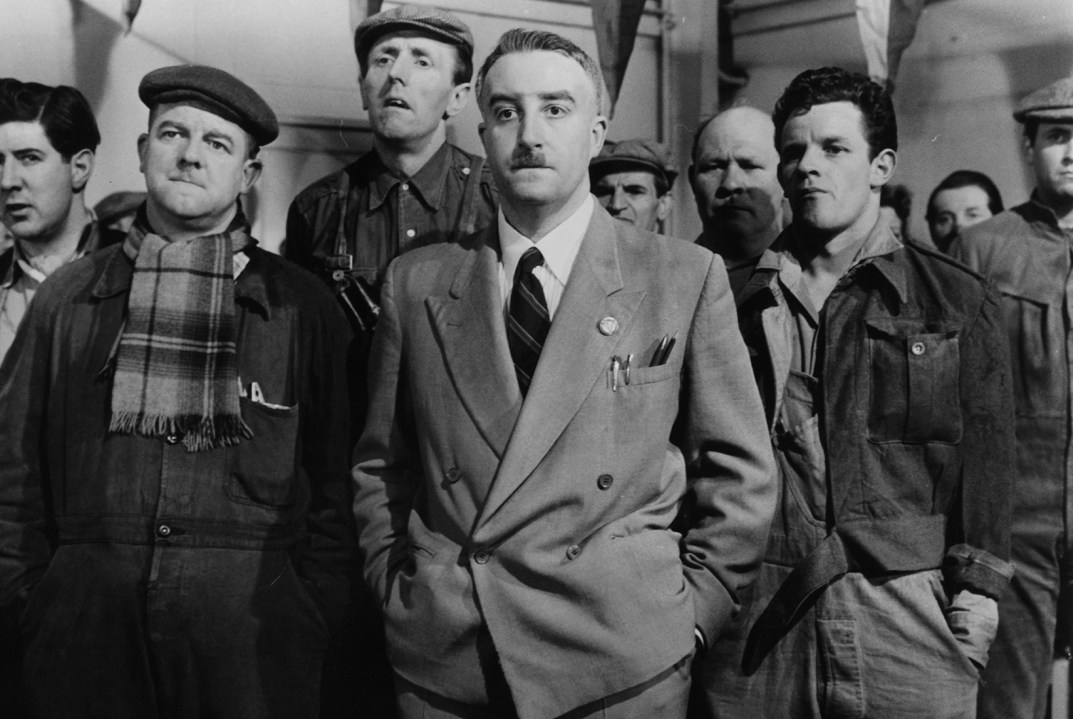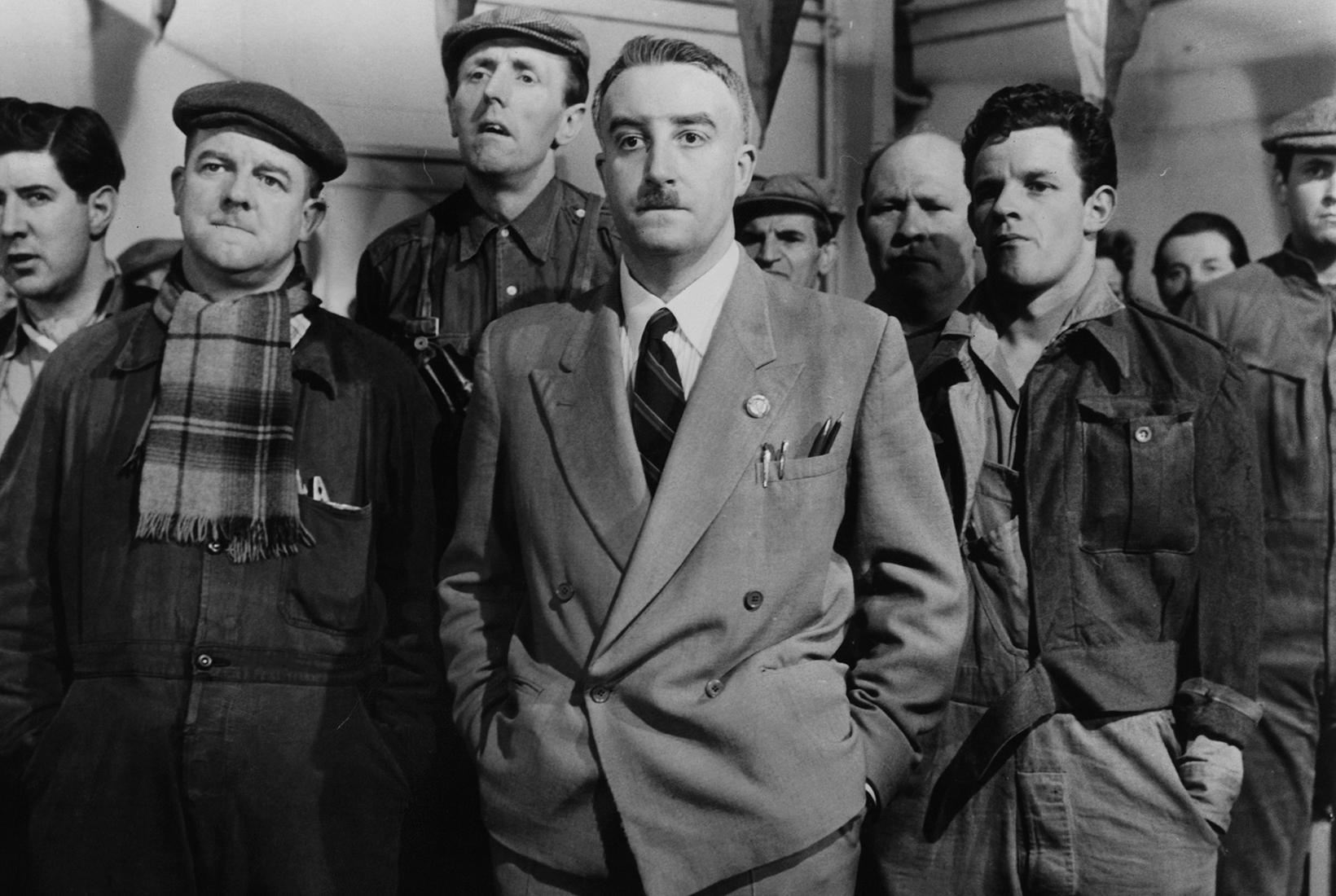The new series of Mark Kermode’s Secrets of Cinema began with an episode on British comedy films. As ever, Kermode was terrific at demonstrating how persistent certain characters and ideas in his chosen genre have proved to be. He traced the theme of ‘the little man’ from George Formby and Norman Wisdom to Paddington Bear, paying due attention to its origins in Britain’s most successful early film export, Charlie Chaplin. Moving on to the subset of little men who think they’re bigger than they are, his judiciously chosen clips revealed how much Captain Mainwaring owes to Captain Waggett in 1949’s Whisky Galore! whom we even saw uttering the phrase ‘I wondered when you were going to think of that’ after an obvious mistake was pointed out to him.
Hyper-awareness of class also featured prominently, and so of course did British unease about sex. As Kermode shrewdly suggested, one reason for the huge success of The Full Monty and Calendar Girls may well be that they depicted Brits achieving the ability to get naked without overwhelming embarrassment for the first time in our cinematic history.
Kermode missed how deeply peculiar many old school British comedy films are when objectively viewed
Yet — and perhaps precisely because he knows all these movies so intimately — one thing Kermode rather missed is how deeply peculiar many old-school British comedy films are when objectively viewed.
I remember a few years ago showing a Carry On film to an American friend in a spirit of international cultural exchange. Faced with her growing incredulity, I suddenly realised that not everybody in the English-speaking world shares a belief in the innate hilarity of such words as ‘it’, ‘pair’ and ‘bullocks’. (In the circumstances I thought it best not to mention that in 1969 — the year of Midnight Cowboy, The Wild Bunch and Butch Cassidy and the Sundance Kid — the biggest hit at the UK box office was Carry On Camping, partly on the grounds that a schoolgirl’s bra pinged off.) There’s also the fact that those of us who grew up with the Carry Ons were encouraged to think that standard ways of responding to the sight of an attractive woman included emitting a low rumbling noise, pawing the ground like a bull, repeatedly banging yourself on the back of the neck, and pulling out your shirt collar so as to let the steam escape.
But if Kermode seemed oddly blind to the weirdness of Britain past, he did a neat, if inadvertent, job of displaying the weirdness of Britain present, as he solemnly denounced the presence of 1950s political attitudes in 1950s films. In particular, he took a dim view of Peter Sellers’s shop steward in I’m All Right Jack not being wholeheartedly in favour of immigration even though he’s a) a fictional character and b) not remotely intended to be any sort of moral compass.
Kermode duly finished by reciting the customary position about the need ‘to acknowledge and celebrate the diversity of modern Britain’ in the manner of someone taking a brave and lonely stance against a customary position. To illustrate his point, he also cited as pretty much the culmination of all British comedy film last year’s multicultural The Personal History of David Copperfield directed by the admittedly brilliant Armando Iannucci. Strangely, though, Iannucci’s education at a Jesuit independent school and graduation with a first from Oxford went unmentioned, and he was described only as ‘a Glaswegian of Italian immigrant descent’.
One of the bright spots of the first lockdown was Staged, in which David Tennant and Michael Sheen played themselves communicating on Zoom as they tried to fill the void by rehearsing Pirandello’s Six Characters in Search of an Author with the theatre director Simon Evans, played by Simon Evans. Like The Trip, the series (along with its audience) had a lot of fun with the characters’ battling egos, the competing claims of friendship and rivalry, and the blurring of fact and fiction.
Now, in the second series both the blurring and the self-satire have been cranked up even further. The premise is that Evans, who in real life wrote and directed the first, has been asked to make an American version, the problem being that Tennant and Sheen aren’t considered well-known enough in the States to play Tennant and Sheen. Worse still, they’re required to give notes to their more famous possible replacements, who this week were Simon Pegg and Nick Frost, exuding just the right amount of casual lordliness.
Already the result is far too nicely convoluted to summarise here. But if you haven’t seen the show, I’d warmly recommend catching up on the whole thing on BBC iPlayer. For one thing, every episode bristles with memorable comic lines, winning believability and an authentic undertow of increasing lockdown desperation. For another, they’re only 15 minutes long.







Comments